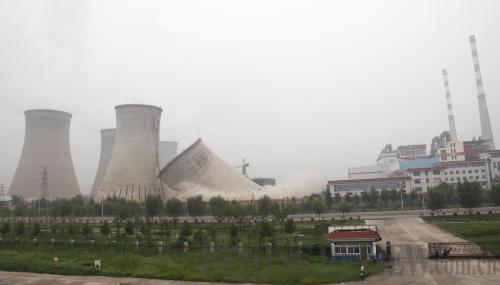|
 |
|
MATE COMMITMENT: Two thermal power units in Zoucheng in east China's Shandong Province are destroyed on August 27 (LV WEIFENG) |
What role has China played in the global campaign to tackle climate change?
The Chinese Government takes the problem of climate change seriously, and has implemented an array of concrete measures to reduce carbon emissions. In climate negotiations, China has also played an active and constructive role, together with other countries, to steer the world toward a climate-resilient future.
But preventing climate disasters requires a concerted effort from the international community. Haggling over one's own gains and losses will not solve the crisis, but will only exacerbate the stalemate.
For its part, China aims to cut carbon dioxide emissions per unit of GDP by 40-45 percent from 2005 levels by 2020. The country also hopes that by 2020, non-fossil fuels will account for 15 percent of its energy consumption and its forest coverage rate will reach 23 percent.
The goal is not within easy reach. At a stage of rapid industrialization and urbanization, China will experience reasonable growth in demands for energy. In addition, the country has nearly 100 million residents still living below the United Nation's poverty line of $1 per day. That means significant constraints in the ability of controlling greenhouse gas emissions.
By the end of 2010, the country is expected to lower energy consumption per unit of GDP by 20 percent from 2005 levels. The result comes at a painful cost—the government has stepped up a heavy clampdown on energy-guzzling sectors and has phased out a handful of polluting industrial capacities.
But after picking the low-hanging fruits, going green will become a bumpier long road for China. The only option is to accelerate restructuring of the economy and to switch to renewable energies. Vigorous efforts are also needed to boost the energy efficiency and green industries.
Despite those difficulties, China is confident it will fulfill its commitment. The green endeavor will require a compromise on economic growth, but is well worth the effort, given its far-reaching implications.
This year marks the 10th anniversary of the Forum on China-Africa Cooperation (FOCAC). What is the extent of China's cooperation with African countries in response to climate change?
China and Africa have many experiences to share with each other, since both are vulnerable to climate change. At FOCAC Ministerial Conference last year, Premier Wen Jiabao pledged that China would strengthen cooperation with Africa to combat climate change. During his visit to Africa earlier this year, Xie Zhenhua, Vice Chairman of the NDRC, met Jean Ping, Chairman of the African Union Commission, and they discussed deeper dialogue and cooperation in the field of climate change.
China has always spared no effort to help African nations, in terms of economic development under the framework of South-South cooperation. In the future, more efforts are expected to focus on climate change. This year, Beijing hosted a series of training sessions for African government officials and technicians regarding adaptation to climate change and mitigation of its effects. The Chinese Government is also considering setting up a South-South cooperation fund to push forward more relevant projects.
What do you expect from the Cancún climate conference to be held late November to early December in Mexico?
In accordance with the Bali Road Map, the UNFCCC parties were supposed to finalize a second commitment period of the Kyoto Protocol. However, that did not happen at the Copenhagen conference in December 2009.
So priority in Cancún is to complete that mission and reach a legally binding agreement on developed countries' emissions reductions targets for the second commitment period. But given rifts between poor and rich nations, Cancún might only be another stepping stone to a substantive deal, which is more likely to emerge at the 2011 conference in South Africa.
A more realistic approach for the Cancún conference is to move forward with a set of decisions on climate financing, technology transfer, capacity building, adaptation and deforestation.
Of course, a successful outcome still depends on the efforts of all parties. It is necessary for the international community to quicken the pace of climate talks and turn words into deeds without delay.
(Source: Beijing Review NO. 43 OCTOBER 28, 2010) |